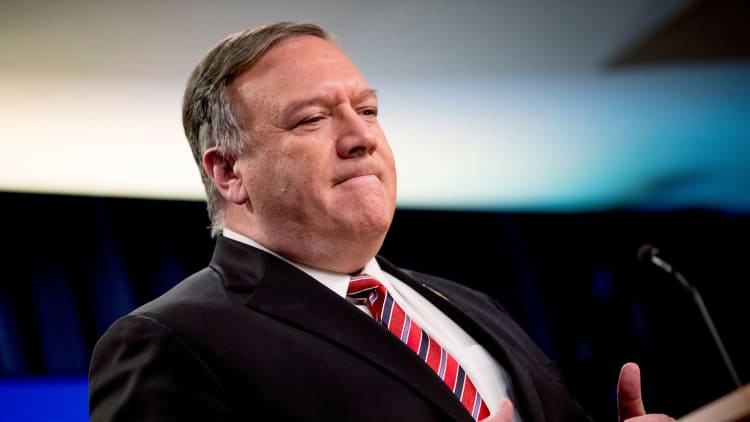
Secretary of State Mike Pompeo on Thursday left the door open for more trade talks between the U.S. and China even as he tripled down on accusations that the country's leadership sought to conceal information about the origins of the coronavirus.
"If they want to engage in the world, if they want to protect property rights, if they want to conduct fair and reciprocal trade, if they are interested in that, which they tell us they are, then yeah, I think there's a path forward to do that," Pompeo said in an interview on CNBC's "Squawk Box."
"If they choose a different path, if they choose a path where they continue to operate in the way that they have operated in the last 25 years, President Trump is going to say, 'No, that doesn't work for the American people or the American worker, and we're going to head down a different path,'" Pompeo said.
The U.S. and China signed a "phase one" trade deal earlier this year with the goal of tackling some of the more divisive issues in a "phase two" deal. Since the first deal was signed, the coronavirus has slowed the global economy, and President Donald Trump has said he may scrap the deal if China fails to meet its purchasing obligations.
Pompeo's trade comments come as the pandemic inspires new tension between the world's two largest economies. The secretary of State has in recent days escalated his rhetoric against China. Pompeo has claimed, without presenting evidence, that the coronavirus may have originated in a lab in Wuhan, China.
Scientists believe that the coronavirus originated in bats from natural causes. That view has been endorsed by Dr. Anthony Fauci, who leads the National Institute of Allergy and Infectious Diseases and has served as the administration's most prominent medical advisor.
The Office of the Director of National Intelligence said in a rare statement last week that it had determined that the virus was not man-made. The intelligence community was still investigating whether it was caused by an accident in a Wuhan laboratory, the statement said.
Evidence: direct or circumstantial?
CNBC's Joe Kernen pressed Pompeo on whether he had direct evidence for his claim, or if the evidence was circumstantial. The Wuhan Institute of Virology, an institute that studies coronaviruses, is located in the area where the coronavirus is thought to have emerged. The institute has been the subject of safety concerns for years.
"One man's direct is another man's circumstantial," Pompeo said, regarding evidence. He said that the U.S. knew "for sure" that Chinese officials sought to cover up the virus when it was first detected. China has apologized for muzzling a whistleblower, Dr. Li Wenliang, who warned about the risks of the coronavirus early on and later died from the infection.
Kernen also asked Pompeo on Thursday whether, despite the rift between the two countries, Americans should still be optimistic about the potential for more trade talks. Investors have warned that new tensions between the U.S. and China could pose a risk to markets.
"We're prepared to go work on these matters in good faith, just as the Trump administration has done for three years now," Pompeo said.
Trump said Sunday that he would "terminate" the phase one trade deal if China did not up its purchases of U.S. goods to meet the pact's terms. The deal calls for China to buy $200 billion in U.S. goods above its 2017 baseline in two years.
On Wednesday, Trump, who is also running for reelection, said he would report in a week or two whether China was fulfilling its obligations, according to Reuters.
Asked about the effect that tariffs could have on U.S. businesses and consumers in the midst of the unprecedented economic downturn, Pompeo said that Trump was "shooting for" no tariffs, but said it was not his top concern.
"I'm most concerned that China do what's right for America's workers and employers. We've seen an unfair trade relationship for an awfully long time," Pompeo said. "President Trump has made a hallmark of his administration fixing that so we can get our economy growing."



